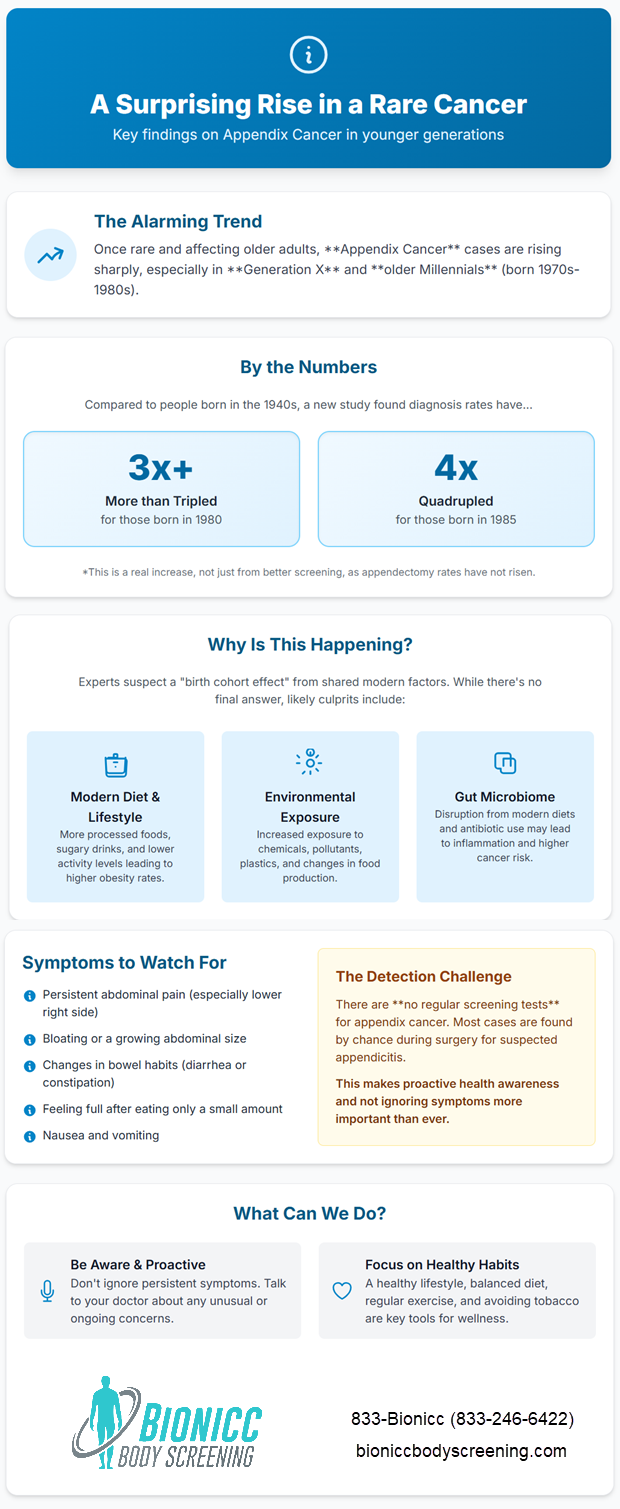For a long time, appendix cancer was considered very rare.
It mostly affected older adults. But a new study has found a surprising and worrying trend: this rare cancer is now rising sharply. This is especially true for Generation X and older Millennials. This discovery has puzzled doctors and shows we need to understand why this is happening. We also need to know what we can do about our health.
This article is based on a study from the medical journal, Annals of Internal Medicine. Researchers from Vanderbilt University Medical Center looked at data from almost 5,000 people diagnosed with a specific type of appendix cancer between 1975 and 2019. Their findings showed that something is changing.
The number of new appendix cancer cases has grown a lot for people born after 1945. The biggest increases were in those born in the 1970s and 1980s. For those born in 1980, the diagnosis rate had more than tripled. For those born in 1985, it had quadrupled compared to people born in the 1940s.

Why is Appendix Cancer Rising in Younger Adults?
The study didn’t give a final answer. But experts believe this trend is likely a mix of modern factors. This increase is a “birth cohort effect.” This means people born around the same time might have shared experiences that raise their risk for a disease later in life.
Changes in Diet and Lifestyle:
Our modern eating habits have changed a lot. We eat more processed foods, sugary drinks, and unhealthy fats. At the same time, people are less active. Obesity rates in young people have gone up a lot since the 1970s.
Environmental Exposures:
We are exposed to different chemicals and pollutants than past generations. The widespread use of plastics and changes in how we produce food could be part of the problem.
The Gut Microbiome:
This is a community of trillions of bacteria in our intestines. It is essential for health. Experts are studying if our modern diet and increased use of antibiotics have harmed this balance. This could lead to inflammation and a higher risk of cancer.
It is important to know that researchers ruled out one idea: better screening. The number of appendectomies has not increased during this time. This suggests the rise in cases is real and not just because doctors are looking for the disease more often.
The Broader Trend: Early-Onset Digestive Cancers
The rise of appendix cancer is not happening by itself. It’s part of a bigger trend. Other digestive system cancers—like colorectal, stomach, and pancreatic cancers—are also being diagnosed more often in younger adults. This suggests these cancers might share some of the same risk factors. It also shows a big shift in when these diseases are appearing.
The fact that this is happening in younger generations points to a possible “new” factor in our world. This could be related to our food, environment, or genes.

What Does This Mean for You? Taking a Proactive Approach
There are no regular screening tests for appendix cancer. This makes finding it early a challenge. Most cases are found by chance during a surgery for suspected appendicitis. This is exactly why preventative health screenings are more important than ever.
[Article: The Benefits of Proactive Health Screenings]
What is a Proactive Full Body MRI?
A full body MRI is an advanced, non-invasive screening tool. It can help find possible problems in organs and tissues throughout the body, often before symptoms start. Unlike many other scans, a full body MRI does not use radiation. It gives a highly detailed view. This can be very helpful for finding potential concerns, including those in the stomach area.
Symptoms to Watch For
Less serious issues often cause these symptoms. But it’s important not to ignore new or ongoing symptoms.
Persistent or unusual abdominal pain, especially on the lower right side.
- A feeling of bloating or a growing abdominal size.
- A change in bowel habits, like diarrhea or constipation.
- A feeling of fullness after eating only a small amount.
- Nausea and vomiting.
If you have any of these symptoms, you must talk to your doctor. You can even mention this study to them to help them know about this rising trend.

How a Proactive Full Body MRI Can Help
At Bionicc Body Screening, we want to help people take control of their health. A full body MRI scan gives a complete look at your internal health. This can be key in the early detection of potential health concerns.
It is not a diagnostic test to diagnose a specific disease like appendix cancer. But it is a comprehensive screening tool that can find things that are not normal and need more medical attention. Full body MRI screenings evaluate the head through the reproductive organs. This could give crucial insights.
By using advanced cancer screening technology, we help give our clients peace of mind. Our modern facility and patient-focused approach make for a comfortable and easy experience.
Schedule Your Proactive Full Body MRI Screening Today to get a complete view of your health and take the first step toward a healthier future.
Here is a video from YouTube about the appendiceal cancer.
This video provides a brief summary and visual representation of the same research findings discussed in this article.
Conclusion
The story of appendix cancer’s rise is a strong reminder that even rare diseases can become more common. It shows the need for more research. It also shows that each of us needs to be an active part of our own health. While researchers work to solve this mystery, proactive health screening and a healthy lifestyle are your best tools for long-term wellness. A healthy lifestyle includes a balanced diet, regular exercise, and avoiding tobacco.
Why Choose Bionicc Body Screening?
Contact Bionicc Body Screening by calling 833-Bionicc (833-246-6422)
Last Updated: September 26, 2025
Author: The Bionicc Body Screening Team
Sources:
- Holowatyj, A. N., Washington, M. K., Goldberg, R. M., & Murphy, C. C. (2025). Birth Cohort Effects in Appendiceal Adenocarcinoma Incidence Across the United States. Annals of Internal Medicine.
- Newsweek. (2025, June 10). Quadruple Rise in Uncommon Cancer Seen in Older Millennials.
- The Jerusalem Post. (2025, June 10). Study reveals alarming rise in appendix cancer among Millennials and Generation X.
- Healthline. (2025, June 17). Rare Appendix Cancer Cases Are Rising in Gen Xers, Millennials: What to Know.
- The Independent. (2025, June 10). Gen X and millennials three times more likely to be diagnosed with appendix cancer than their parents, study finds.
- Everyday Health. (2025, June 10). Appendix Cancer Sharply Rises Among Gen Xers, Millennials.